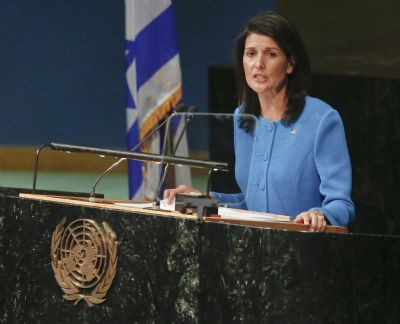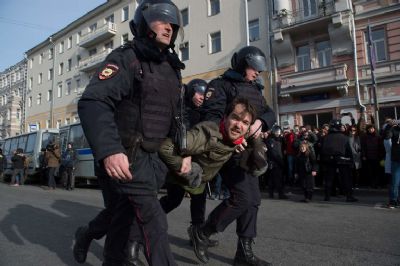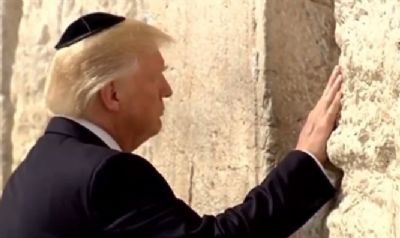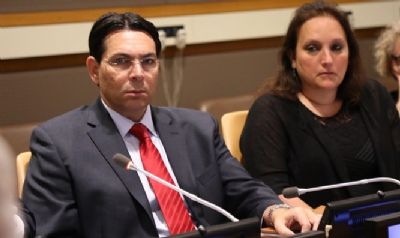Share
What's New
Resources updated Thursday, May 25, 2017
May 25, 2017

"The United Nations Human Rights Council is preparing a blacklist of American and other companies doing business with Israel-and U.S. taxpayers are paying a quarter of the bill.
The council's move embraces the 'boycott, divestment and sanctions' campaign, which seeks to accomplish through economic strangulation what Israel's enemies have been unable to achieve through war and terror. How did the U.S. get on the wrong side of this battle?
When the Human Rights Council was created in 2006 as a 'reform' of the original U.N. Human Rights Commission, the Bush administration voted against, because no membership conditions required actually respecting human rights.
But Barack Obama jumped on board and, playing Gulliver at the U.N., allowed the American giant to be tied up by foes contributing a fraction of our moral and financial weight. In 2016 Americans sent the U.N. almost $10 billion.
On Thursday a U.S. Senate subcommittee will meet to 'assess' the Human Rights Council. Reconsidering U.S. membership and walking away-now-is the right choice. Successive White Houses have tried and failed to correct the entrenched anti-Israel and anti-Jewish bias of the council (and commission) for decades Simply put, the Lilliputians have more votes.
The council has condemned Israel more than any of the other 192 U.N. states, notwithstanding 500,000 dead in Syria, starvation and mass torture in North Korea, and systematic, deadly oppression in Iran. Saudi Arabia and China have used their seats on the council to avoid condemnation altogether. Under a sanctions resolution adopted in March 2016, the council is creating a database of companies that 'directly or indirectly' do business with Israeli settlements. The blacklist is intended to be expansive: Even an ATM in Arab-claimed territory could be enough to land a bank and its business associates on this database. The blacklist threatens to tarnish business reputations, make companies targets for lawfare in European and U.S. courts, and provide fuel for the boycott-and-divestment machinery on college campuses and elsewhere. Meanwhile, the council has no boycott policy for the world's most ruthless regimes.
When Donald Trump became president, the U.S. did not promptly resign from the council but instead attended the March 2017 session. During this meeting, the resolution creating the Israel blacklist was reconfirmed over American objection. Then the U.S. was outvoted on 12 of 15 resolutions and backed into joining the consensus on various other resolutions, including one on 'cultural diversity' cosponsored by the likes of North Korea.
As the Senate subcommittee meets, it will hear the familiar refrain echoed whenever American blank checks to the U.N. are questioned: fight the good fight from the inside; don't cede the territory to enemies; the sole alternative is self-defeating isolationism.
But the answer is straightforward. Belonging to, and paying for, the U.N. Human Rights Council legitimizes those fighting to delegitimize Israel. Equal rights for some cannot be built on unequal rights for Jews. Reform from the inside has failed. America should choose its own partners and methods for making the world a better place. That's real leadership."
A Council America Shouldn't Keep Article

A UN Committee. charged with allowing non-governmental organizations (NGOs) to gain greater access to the UN, continued its bi-annual session on May 25, 2017 by blocking access to NGOs that promote women's rights and anti-corruption measures. Members of the UN NGO Committee include Iran, Russia, Cuba, Pakistan, Turkey, and Nicaragua, all of which actively use their Committee membership to stymie applications for UN status from NGOs active in the field of human rights.
Using procedural ruses, members of the Committee can, and often do, defer applications session after session with inappropriate, specious or repetitive questions and demands of the NGOs.
Among the organizations blocked in this manner today:
- Russia blocked a Russian NGO, the "Anti-Corruption Foundation," by asking the organization about any connections with the "Open Russia" movement, an initiative advocating democracy and human rights in Russia;
- Turkey blocked the organization "World Without Genocide," which recognizes the slaughter of 1.5 million Armenians by the Ottoman Empire as a genocide
- Pakistan attempted to demand the organization "Women Living Under Muslim Laws – International Solidarity Network" explain its position on existing legislation on homosexuality in the Muslim world. The U.S. expressed serious concern at the question, leading to the Pakistani representative simply rephrasing the question to address "sexual rights" instead of homosexuality;
- Nicaragua continued blocking organizations dedicated to reproductive rights, including the American organization "White Ribbon Alliance for Safe Motherhood" and the British NGO "World Association for Sexual Health";
- For the second time this year Iran blocked a pair of American organizations dedicated to women's rights, including "Women's Freedom Forum" and "Women's Voices Now," asking the latter why it only focuses on a "specific religion" in a "specific region," a similar question to what Iran asked the Women's Freedom Forum at the Committee's last session in February 2017; and
- Azerbaijan blocked Armenian NGOs – "SEG" Civil Society Support Center NGO and the Society Without Violence – asking for information on projects they undertake in the Nagorno-Karabakh region (a region in dispute between Armenia and Azerbaijan).

Netanyahu: Trump Visit To Western Wall 'Destroyed UNESCO's Lies' Article

Bereaved Mother to UN: Do Not Reward Murderers and Terrorists Article
